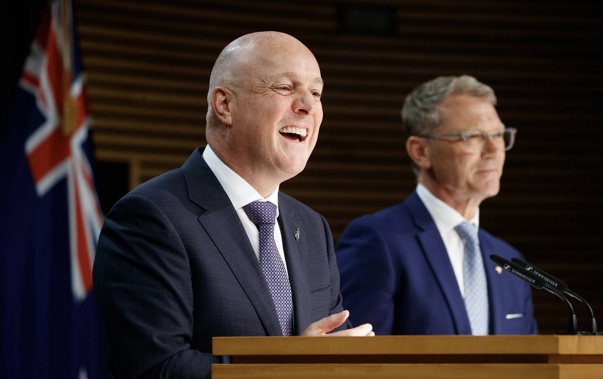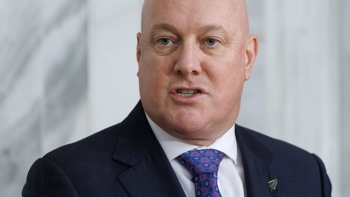
One of the coalition Government’s achievements in its first 100 days was the easiest of ticks after officials said it would required “no actions” to implement.
Prime Minister Christopher Luxon and Justice Minister Paul Goldsmith fronted a press conference on February 7 to announce that the 30 per cent target to reduce the prison population over 15 years had been abolished - and then faced a barrage of questions about the merits of cancelling what had effectively already been cancelled.
The target had been a policy of the Labour Government from 2017, when the prison population was bursting at the seams, and incoming Corrections Minister Kelvin Davis was then looking at such last-resort options as putting prisoners in retired boarding schools or triple-bunking them in prison cells.
But the prison population - which peaked in March 2020 - started to decrease, in part due to several programmes to make the criminal justice system more efficient and much greater use of non-custodial sentences in both the youth and adult justice jurisdictions. Research has suggested that more community sentences in youth court correlates to fewer young adults in the prison pipeline in later years.
Whether crime increased under Labour’s watch was a hotly debated topic during the election campaign, with law and order high on many voters’ list of priorities, after the cost-of-living crunch.
Statistics showed a slight increase in recorded crime in recent years, in part due to how much easier it was to report retail crime, as well as new family violence offences.
Youth crime also increased in recent years, including with high-profile ram raids, but the New Zealand Crime and Victims survey - which accounts for the estimated 80 per cent of crime that goes unreported - showed no significant difference in total crime.
Labour leader Chris Hipkins said during the election campaign that he would not have a target if re-elected, which prompted a “six years too late” response from the National Party.
Abolishing the target, however, remained on the coalition Government’s 100-day action plan after it was sworn in on November 27 last year./cloudfront-ap-southeast-2.images.arcpublishing.com/nzme/HGADORR5EJBKNCTNIRGSJC54WM.png) A December 1 email from the Department of Corrections to Corrections Minister Mark Mitchell's office, released under the Official Information Act.
A December 1 email from the Department of Corrections to Corrections Minister Mark Mitchell's office, released under the Official Information Act.
Within a few days, on December 1, Corrections Minister Mark Mitchell’s office sent an inquiry to the Department of Corrections about the target, documents released to the Herald under the Official Information Act show.
It asked for background on the target including “how and when”, who owned it, what work had gone towards achieving it and what options there were to remove “any prison population target”.
Five hours later, that afternoon, Corrections replied that it had no target to reduce the prison population.
Though the 30 per cent reduction target was part of the Labour Party’s 2017 election campaign and subsequently confirmed as Government policy when Labour was in power, “no specific actions were taken to formalise this target within Corrections”, the Corrections email to Mitchell’s office said.
“As the target to reduce the prison population was owned by the previous Government, there are no actions Corrections can take that would give effect to the coalition Government’s 100-day plan commitment to ‘abolish the previous Government’s prisoner reduction target’.”
The email added that Corrections only has “a limited ability” to influence the prison population as it was only part of the criminal justice system.
Corrections had done some work that made the system more efficient, which contributed to some reduction in the prison population. “This includes our contributions to the High Impact Innovation Programme and the Criminal Justice System Performance Programme.”
The former includes support for bail hearings, including linking those eligible for bail with social service providers. Those enrolled in Bail Support Services were found to be 10 per cent more likely to be granted bail, 32 per cent less likely to be charged with offending while on bail and 17 per cent less likely to be sent to jail when sentenced.
The latter includes ways to improve the timeliness of the court system, including changing the timing of when defendants can elect a jury trial - which typically take longer than non-jury trials - and requiring police to provide them with more and earlier information to encourage earlier case resolution.
During the February 7 press conference, Luxon said he didn’t recall Labour scrapping the target, even though Mitchell had released a statement about it.
“In that election campaign, it was pretty hard to work out what was actually being committed to or wasn’t being committed to by the previous Government and there was obviously a scramble going on,” Luxon said at the time.
Asked if officials had told the Government that the target was still in place, Luxon said: “I’m unclear whether the target was [still] in place. I remember through the campaign, there were rumours that it may not be, but it’d obviously been a long-standing policy and practice of the previous administration.”
Asked where the target officially sat, Goldsmith said it was something the previous Corrections Minister had conveyed.
“It [abolishing the target] didn’t require a Cabinet paper. What it required was a Government that knew what it wanted to achieve in the justice sector. It was an important target that actually filtered through the whole justice sector over the past years.”
Luxon said scrapping the target sent a message.
“We’re just making sure there’s no ambiguity. There’s no 30 per cent target. Whether that was announced in the death throws of a campaign where there was lots of desperation going on from the Labour Government I don’t know, but the bottom line is it’s not happening.
“Our target is going to be reducing crime, not reducing prisoners.”
The Government plans to announce targets around youth crime, violent crime and the time it takes for a case to go through the courts.
Take your Radio, Podcasts and Music with you









